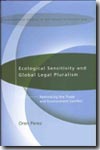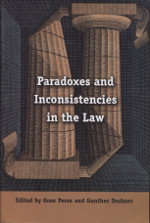Ecological sensitivity and global legal pluralism
rethinking the trade and environment conflict
- ISBN: 9781841133485
- Editorial: Hart Publishing
- Fecha de la edición: 2004
- Lugar de la edición: Oxford. Reino Unido
- Colección: International Studies in the Theory of Private Law
- Encuadernación: Cartoné
- Medidas: 24 cm
- Nº Pág.: 290
- Idiomas: Inglés

The tension between trade liberalisation and environmental protection has received remarkable attention since the establishment of the WTO. It has been the subject of a wide-ranging debate, and is one of the central themes of the anti-globalisation movement. This book explores that debate. It argues that by focusing on the WTO, the debate has failed to recognise the institutional and discursive complexity in which the trade-environment conflict is embedded. A legal investigation of this nexus requires a framework of inquiry, in which this complexity can be elucidated - a model of global legal pluralism. The first theoretical part of the book (Chapters One and Two) responds to this challenge by developing a pluralistic model, which recognises the trade and environment conflict as the product of multiple dilemmas, constituted and negotiated by a myriad of institutional and discursive networks. As such, this conflict cannot be understood or addressed through one- dimensional models. Viewing the trade-environment conflict through a pluralistic perspective yields important practical insights. It means that this conflict cannot be resolved by uniform economic or legal formulae. Dealing with this conflict requires, rather, polycentric and contextual strategy. The empirical part of the book (Chapters Three to Seven) explicates this thesis by examining several global legal domains, ranging from the WTO to 'private' transnational regimes such as transnational litigation, international construction law and international financial law. This part demonstrates how the different discursive and institutional structures of these domains have influenced the contours of the trade-environment conflict, and considers the policy implications of this diversity from a pro-environmental perspective.







